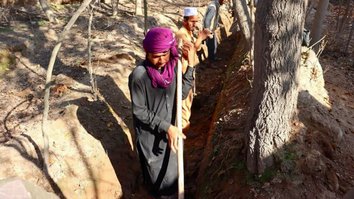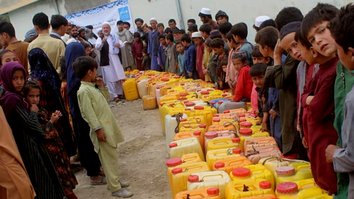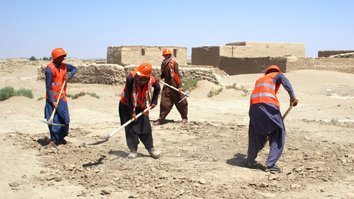KUNDUZ -- The United Nations Children's Fund (UNICEF) has completed two water supply projects in Jawzjan province, providing some 2,000 families with access to clean drinking water, say local officials.
The projects involved building water reservoirs, digging deep wells, installing solar water pumps and creating a 400-metre-deep water supply network, according to Assadullah Hamza, director of the Jawzjan Provincial Rural Rehabilitation and Development Directorate.
The infrastructure was built in Tanga and Hassan Tabeen villages in Sheberghan, the provincial capital, and Bizgak village in Faizabad district, Hamza said.
"The projects were completed within a three-month time frame and officially inaugurated on April 21," he added.
"With funding provided by [UNICEF], these projects cost up to 9 million AFN and have addressed the lack of drinking water for 2,000 families and 1,000 students at a local school," he said.
"The role of the UN agencies has been crucial in this critical juncture of time, and every project that is implemented through these organisations is extremely effective, both in terms of development and creating employment opportunities for the people," Hamza said.
Access to clean drinking water
Jawzjan residents previously fetched drinking water from rivers and streams, risking infection -- especially among children and the elderly.
Most residents had no other choice but to drink salty groundwater, Naqibullah Haidar Bek, a resident of Bizgak village, said.
"Digging deep wells or shallow wells alike did not work in our village because it has salty water. Now that a water supply network has been built and clean water has reached the public, we are very pleased," he said.
Villagers previously also drank unclean water from ponds and streams because of poverty, Haidar Bek said.
"This resulted in children and the elderly contracting seasonal diseases in the summer," he added.
As many as 1,000 students now have access to clean drinking water, Mohammad Zakir Khairandesh, a teacher at Hassan Tabeen Middle School in Jawzjan's Sheberghan city, said.
"Unfortunately, our students did not have access to clean drinking water for several years. Some of them brought water from home, and others used water from streams and ponds," he said.
"Almost all of our students got diarrhoea from drinking unhealthy water, but now that our students' problems have been addressed, we are so grateful," he added.
More projects under way
Meanwhile, two other drinking water projects are under way in Sheberghan and Aqcha district, Mohammad Zarif Faiez, Jawzjan's provincial economic director, said.
The Organisation for Relief Development, an Afghan NGO, is implementing the projects with $107,000 in funding from the UN Office for the Coordination of Humanitarian Affairs, he said.
"These projects started on April 20 at the request of the villagers in Sheberghan's centre and Mangoti and Noor Abad villages and Panja village in Aqcha district," Faiez said.
More than 300 families will have access to clean drinking water in three months, once the projects are completed, he added.
40 years without public works
This is the first time in 40 years that public welfare projects have been implemented in these villages, said Mohammadullah Rabbani, a tribal elder in Sheberghan.
"We are very grateful that the lack of drinking water has been resolved because we were facing many challenges from not having a source of drinking water in our village," he said.
"The unavailability of drinkable water forced our villagers to bring much-needed clean water from Sheberghan city, which is 3km away from our village," he added.

![Local residents and authorities in Sheberghan, capital of Jawzjan province, attend a ribbon cutting ceremony on April 20 for a water supply project funded by UNICEF. [Jawzjan Rural Rehabilitation and Development]](/cnmi_st/images/2022/05/06/35288-jowzjan-585_329.jpg)







With the beginning of this project in Jowzjan province, many families are able to have access to safe drinking water. This UNICEF program is very pleasing. The residents of Jowzjan province have been getting their drinking water from the rivers for years, and they are suffering from various diseases by drinking this non-healthy water. I welcome the installation of the deep well pump systems by UNICEF organization. And it is hoped that the people of Jowzjan province will make good use of this deep well. With respects, Musawar
Reply4 Comment
It makes me happy to see someone doing infrastructural work. Even if a single brick is used to build the country, it is considered a benefit in the ongoing economic crisis. Another important point is that clean water is provided by implementing such projects. Many families got legitimate food during the past three months while they took part in the country's construction rather than destroying the country.
Reply4 Comment
This is a good move, but frankly it is a very small and primitive step to solve the problems of drinking water in the country. Instead of digging deep wells that are temporary but will cause long-term problems such as groundwater shortages, partner agencies should focus on building large water supply networks so that more people can benefit from safe drinking water, and on the other hand, make a permanent solution to solve this problem. Unfortunately, for the past 20 years, international partners have focused on small, short-term projects and continue to do so.
Reply4 Comment
Good news
Reply4 Comment